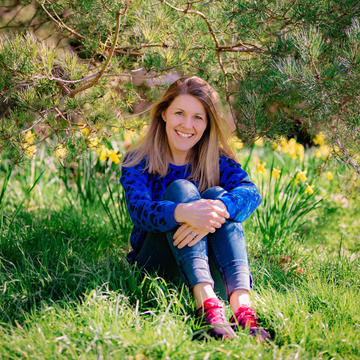Sally Dear, founder and CEO of Ducky Zebra

Sally Dear is the founder and CEO of Ducky Zebra, a sustainable, gender neutral children’s fashion brand set up in 2021. Sally studied history at university and worked in marketing for 15 years before setting up her own business. Ducky Zebra reimagines children’s fashion from ages 0 to 6 years, free of gender stereotypes using bright vivacious colours and patterns which aim to inspire kindness and confidence in children, both girls and boys. As a clothing brand Sally is also very conscious that fashion is one of the highest polluting sectors in the world and thus Ducky Zebra uses sustainable practices in the manufacturing of their clothes. As part of the Meanwhile in Oxfordshire programme, which fills up vacant retail space in Oxfordshire Sally was one of four successful (out of 300) applicants in gaining a space in the Oxford Covered Market. She had a pop-up shop for a four month period, which was great for building brand awareness. She also supplies online and aims to be primarily online. Clothes at the moment are heavily gendered, Sally says and ultimately the vision behind Ducky Zebra is to create a world where every child (and every adult feels) equal. Clothing is an important way in which this can be achieved.

My background is in marketing, mainly in the automotive and rail industries. I am also a mum of two and a couple of years ago my at the time four-year-old daughter made a comment that there were certain occupations she wouldn’t be able to do when she grew up because she was a girl. This really stuck with me especially as I felt I was setting a good example for my children; being a successful working woman and actively creating a gender stereotype free space in our home. It made me realise that the world around my children, the books, the clothing, the toys and so much more was so ingrained with gender stereotypes which I wanted to help dismantle. This spurred me on to one area where I could make an active change, children’s clothing.
What is your definition of entrepreneurship?
Entrepreneurship, or an entrepreneur to me is a creative problem solver. The essence of entrepreneurship is seeing a problem and creating a unique solution.
How and when did you know your idea was good enough to develop it?
When I identified the problem, the pervasion of gender stereotypes, particularly in girls clothing which is often pink frilly and impractical, I didn’t yet know my solution. So, I did research and conducted a survey of over 1000 parents and carers about the topic which was very insightful. I found that parents and carers were also frustrated over the offering in boys’ clothes, and also that the available offerings in unisex clothing were mostly beige and monochrome in colour, which children tended not to like. I also conducted desk-based research to identify possible gaps in the market. These findings helped reorient my thinking: to create unisex sustainable clothing that would benefit boys and girls equally. Research shows that there are links between gender stereotypes in early life and later life decisions, mental health behaviours and so on. So, I decided to create unisex clothing for children which would be bright, fun and inspire kindness and confidence in those who wear them. I then set up the business on my own, with help from various experts; most of my marketing experience was in website design so I primarily created the website myself. I then worked with a freelance designer with a background in children’s fashion to design the clothes. I also worked with parents and children in the design process to make sure the clothes would be appreciated by children as well as be practical for them.
What would you say are the top 3 skills that needed to be a successful entrepreneur? Why?
Firstly resilience because there will always inevitably be setbacks and things outside your control. For example I set up a pop up stall in the Covered Market and soon after omicron hit and footfall dropped dramatically; so being able to cope with setbacks and pivot your approach is essential. Linked to this I would also say it’s important to have determination to persist and to constantly push your business to evolve, you can’t sit back and relax because the market is so competitive. Finally, being creative is key not just in design, but also with the ideas you have for your business and how you plan to grow and improve it.
What is your favourite part of being an entrepreneur?
My favourite part of being an entrepreneur is pursuing the purpose of the business, and being able to make a positive difference to the world my children live in.
What individual, company or organization inspires you most? Why?
Holly Tucker the founder of Not On The High Street, who has now set up Holly & Co., an organisation completely focused on supporting small business. She inspires me through her energy, authenticity and business acumen.
If you had 5 minutes with the above individual/ company/organization, what would you want to ask or discuss?
I actually was able to speak with Holly before I launched Ducky Zebra and she suggested I try a pop-up stall, I followed up on that advice which has been so helpful. If I was able to speak to her again, I would love to understand her journey in entrepreneurship because I think she would be open and honest about the mistakes and the difficulties; and I believe it is invaluable to learn from our mistakes. I would also just love to receive any advice she had.
What has been your most satisfying or successful moment in business?
I developed the business during the pandemic so there have been so many challenges along the way: our factory closed down for six months because of lockdown, shipping was delayed and so on. When the clothes arrived that was a standout moment as well as the first photoshoot we had with my kids and their school friends, which was actually during the second lockdown. Getting the photos back made me realise that I was starting to create my brand and seeing that children really liked the clothes was so satisfying.
What would you say have been some of your mistakes, failures or lessons learned as an entrepreneur?
I have so many ideas and get really excited so an important lesson for me has been not to try to run 100 miles per hour, make sure with each step you have done your due diligence because otherwise things become messy. Another important lesson was learning to recognise my strengths and weaknesses and know when to bring in help. For example, the financial side is not my strong suit but in a business is so important, so I have now brought in an accountant
How have you funded your ideas?
It has all been self-funded up to this point. I did win the Pitch for the Future competition from which I received £1500 which was fantastic, but mostly self-funded.
Are there any sector-specific awards/grants/competitions that have helped you?
I would like to look for grants and gain investment in the future, so I’m looking out for those. The Pitch for the Future competition was a great starting point.
What is good about being an entrepreneur in Oxfordshire? Bad?
The abundance of resources available for small businesses. Independent Oxford is a networking organisation with over 150 small businesses, which was very helpful , and introduced me to a great group of people in similar situations, who I could bounce ideas off. OxLEP and their Escalate programme particularly which aims to help businesses with a purpose trying to do good has been helpful. Through them I have received lots of training and entered into the Pitch for the Future competition. Also, the Meanwhile in Oxfordshire project which fills empty retail space through which I got a pop up stall has been amazing.
If a new entrepreneur or startup came to you looking for entrepreneurship resources, where would you send them?
I would definitely recommend Independent Oxford and advise people to become familiar with OxLEP which is such a useful resource, especially the Escalate programme if that is relevant to your business.
Have you faced any challenges as a woman entrepreneur? If so, how have you overcome them?
At the moment no, I do want to start looking for investment and I’m aware that female owned businesses are less likely to receive investment than male owned businesses so it might be a challenge in the future.
What resources would you recommend for other women?
In some ways, and at this stage of my business I have found being a woman very handy because there are lots of fantastic groups focused on supporting women in business. I would particularly recommend the Empowering Entrepreneur in Oxford which is a female only group through which I’ve met many great contacts.
How could institutions such as the University of Oxford better support women entrepreneurs?
Because I’m not affiliated with the University, I’m not sure of the opportunities available so perhaps a better advertisement of organisations such as IDEA to female entrepreneurs, and entrepreneurs in general would be beneficial. I would love to collaborate with the University, perhaps for example working with students to expand the designs of clothes beyond the 6-year-old. I also did a webinar a couple of weeks ago on the impact of gender stereotypes on early years, and working with a masters student or someone researching this in an educational forum might also be an exciting possibility.
Any last words of advice?
Collaboration is so important, find like-minded people or businesses at similar stages in their journey to you to bounce ideas off. Sometimes running a business can be lonely if you are a solo entrepreneur and collaboration has been invaluable for me. And keep hold of love and passion for your business. It is not a 9-5 job, there is lots of hard work but If you love the business you are creating you will be always be able to push through.
Share this
More news



